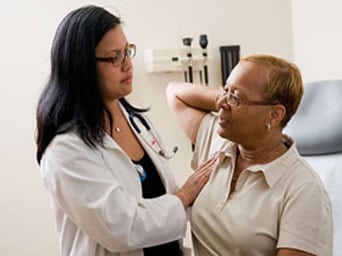 The Veterans Affairs (VA) Maryland Health Care System is recognizing Breast Cancer Awareness Month this October by asking all female Veterans to talk with their health care providers about appropriate breast cancer screenings, such as regular mammograms.
The Veterans Affairs (VA) Maryland Health Care System is recognizing Breast Cancer Awareness Month this October by asking all female Veterans to talk with their health care providers about appropriate breast cancer screenings, such as regular mammograms.
“The VA Maryland Health Care System has an outstanding breast screening program,” said Dennis H. Smith, director of the VA Maryland Health Care System. “I urge all women Veterans to talk to their providers during Breast Cancer Awareness Month about receiving the appropriate screening.”
Both men and women can develop breast cancer, though male breast cancer is rare. In women, breast cancer is the second most common cause of cancer death and the odds that a woman will be diagnosed with breast cancer in her lifetime are one in eight.
The good news is that the overall five-year survival rate from breast cancer is nearly 90 percent. If the cancer is caught while it is still located only in the breast, the survival rate increases to nearly 99 percent.
A regular mammogram, or x-ray of the breast, is one of the most effective ways to detect breast cancer early. VA excels at breast cancer screenings, outperforming private health care systems, with 87 percent of eligible women receiving screening mammograms. However, VA is concerned that every woman get appropriate screening.
“If you are over 40, you should talk with your provider about an individualized plan for breast cancer screening based on your medical history,” said Dr. Catherine Staropoli, the medical director of the Women’s Health Clinic for the VA Maryland Health Care System. “Early detection can improve survival.”
In line with national guidelines, the VA Maryland Health Care System encourages all women between ages 50 and 75 to get mammograms every two years. Women ages 40 to 50 and those older than 75 should talk with their providers about the risks and benefits of having mammograms and make a decision based on their individual risk factors.
Although rare, a younger woman can also get breast cancer. Any change from normal should be checked out by a health care provider.
Breast cancer risk factors include getting older, having a close family member with breast cancer, being overweight or obese, previous radiation therapy/exposure to the breasts or chest, not exercising, and having certain gene mutations. Having these risk factors does not mean that a woman will develop breast cancer, but they should be brought to the attention of her health care provider.
There are currently 47,276 women Veterans in Maryland, but across the nation, women Veterans comprise the fastest growing subpopulation of Veterans. The number of women Veterans is projected to be more than 10 percent of the Veteran population by 2020. These statistics are historic, with the more than 350,000 women in today’s armed forces assuming leadership roles and responsibilities impossible for them to attain 20 or 30 years ago.
The VA Maryland Health Care System offers its women warriors a full spectrum of services, including breast and cervical cancer screenings, gynecological evaluation and treatment, and in-house mammography and bone density screens. Constantly adding and improving services, the health care system recently began offering the human papilloma virus vaccine to younger women Veterans.
The VA Maryland Health Care System currently has 14 women’s health care providers and two surgeons who provide gender specific care to women Veterans, with plans to expand this number. Eight of the nine locations, which include six community based outpatient clinics, offer gender-specific providers and services. Gender specific services such as maternity care and pelvic oncologic surgical care that are not available from VA can be outsourced to local providers.
If you are a Veteran enrolled in the VA Maryland Health Care System and you want to speak to your VA provider about breast cancer screenings, call the Appointment Line at 1-800-463-6295, ext 7333.
ATTENTION READERS
We See The World From All Sides and Want YOU To Be Fully InformedIn fact, intentional disinformation is a disgraceful scourge in media today. So to assuage any possible errant incorrect information posted herein, we strongly encourage you to seek corroboration from other non-VT sources before forming an educated opinion.
About VT - Policies & Disclosures - Comment Policy



